
'Life was super. It was all pretty girls'
The Independent Writer
Fearless driver, red-hot lover, international playboy? Stirling Moss is the archetypal British daredevil. But, now he's 71, might this Boy's Own hero be growing up at last? Britain's Independent writer Julia Llewelyn Smith met with the man and the legend, for a frank and rare interview about his old and present days. You don't want to miss this!
We meet in his hi-tech bachelor house in Mayfair, where today the decor is so retro as to be the height of fashion. There's wall-to-wall beige carpeting, brown velour sofas, lots of china cats and an ivory elephant under the computerised grand piano. There are silver trophies everywhere. A cupboard opens up to reveal a bar, with glasses hanging from the mirrored doors.
He leads me into the "den", a tiny room with panelled walls and another cosy sofa. "I used to entertain in here," he says. "I was a bit of a man about town, you know." He presses a switch and a table descends from the ceiling. "My housekeeper would have laid it for dinner." Push other buttons and panels roll back to reveal the television and stereo. "The girls would press this one and I'd say 'Steady on, old girl, you've just run a bath two storeys up.'"
His name is still synonymous with speed and derring-do, even though more than half his life has been spent off the race track. Yet he is still transfixed by those golden years: "You know, the life that I led then was absolutely fantastic. There wasn't the pressure that there is now, in terms of sponsorship. Life wasn't too regimented. The money wasn't much, but the quality of life was super. It was all travelling and pretty girls and dancing."
The drawback was that motor racing at the time was – short of war – the most dangerous activity on the planet. The cars were flimsy, the circuits badly constructed. "I was losing three or four friends a year and that's very tragic, but the only way I could accept it was to think, 'Well, I wasn't going as fast as he was.' You always found a reason to excuse why you were alive and they were not. Anyway, you needed the danger. It was like cooking with salt, it gives it a lot more flavour."
If Stirling ever felt nervous, he didn't show it. While other drivers sat tense in the cockpit, he preferred a laid-back slouch. He wore short sleeves to get a suntan, considered helmets "sissy" and loved nothing more than to lift his hand from the wheel at 120mph to wave at the crowd.
Stirling is certainly a canny operator. His Jewish dentist father and Scottish mother (he was named after her home town), brought him up to be frugal. He built his house on a bombsite, purchased in 1961 for £30,000. "Bloody good investment, but it's home so I won't sell it," he sighs. And, he sits in a leather swivel chair, his phone placed prominently in front of him. "I can't afford to miss any business."
After the crash, Stirling had to reinvent himself. "I had to retire, because even though my speed was acceptable, how I got to it was not," he explains. "I couldn't just get in the car and drive fast, I had to concentrate like hell. I would have had to have driven more slowly than I would have liked and be beaten by people whom I didn't respect. So the decision to give it up was fairly easy."
The question was, what to do next? "I was left with no income and with no education or experience in anything outside racing. The only way that I could scratch a living together was to sell my name, and that's what I still do. If someone has a garage, then hopefully they'll ask me to open it. Basically I'm an international prostitute. I sell my time for money."
The rest of his time is spent zooming around London taking care of his 10 rental properties. Even on Christmas day, he has been called out to fix a tenant's washing machine. "If I manage to repair a microwave, I feel wonderful. It's almost like getting pole position. It's a challenge and I love it."
His authorised biography has just been published, a weighty coffee-table tome, full of glossy pictures. "I'm very pleased with it as a piece of merchandise," he says, smiling. "It's only £30, which I think is very good value."
Happily, the finished book is full of salacious detail. There's his attempt to lose his virginity to his father's receptionist, ruined by his mother rushing in. There's the dancer from the Folies Bergeres who asked him to dance at his 21st birthday party, saying, "I'm Yvonne and I'm your birthday present." Stirling moved in to the flat she shared with three other girls – scandalous behaviour in 1950.
His life is chronicled in 96 huge scrapbooks stored in the hall. The green books hold the professional cuttings, but there are far more black ones for the personal. Stirling's bachelor days were an endless round of French-farce mishaps, with one girlfriend finding him in bed with another. "I never lied. I never said, you are the only person in my life, although I wouldn't rub their nose in it, either. But it's inevitable, if you lead as public life as I did, you get caught out. David Coulthard got all that stick for cheating on Heidi, but he was only running two. I could cope with that – when you got into double figures it was hard. Well, maybe double figures is an exaggeration, but I was pretty busy."
Stirling appears to be the archetypal Englishman, but at Haileybury, his public school, he was bullied for being Jewish. When he received his knighthood in 1999, he said he was pleased to be "accepted" after so long. "I do think that my experiences at school turned me into a survivor. It set up a character. It made me a racer, as opposed to a driver. When I get in a car I want to win.
"The downside of being so competitive is that one tends to be selfish. People had been asking me my opinions since I was 17, which made me think I was more important than I really was. It made me a bit of a control freak and I'm impetuous too, I make a decision in an instant which can make me very difficult to live with."
His first marriage was brief. "I wasn't ready for it. Right person, wrong time. My second marriage, to Elaine, was based on nothing but sexual attraction, and that was definitely a mistake. She was a swinger and I wasn't. We had nothing in common."
"Oh, I can't tell you, I am so lucky to have Susie," he says. "You know, she learned to change the ratios on a racing gearbox. She does all the stuff in the office. The place would grind to a halt without her."
At this point Susie enters, tall and glamorous in a grey silk pantsuit and high-heeled, jewelled mules: all at 10 in the morning. Some wives might be put out by Stirling's unromantic tribute. Susie, I suspect, would not. "We're on the cabbage soup diet at the moment – not that Susie needs to be, the silly sod," says her husband, slapping her bottom.
"Susie knows everything about me, there are no skeletons in the cupboard. When she moved in with me, she kept finding hairpins in the bed. She was extremely tolerant, but in the end she said, 'If you are going to go out with other women, I'm going to go out with other men.' Well, I didn't think this was right at all. She called my bluff. I'm not much of a chauvinist, but there are certain things I believe in."
Stirling has a daughter, Allison, 33, from his second marriage. "She's married to an awfully nice bloke. He came to see me and I thought he was going to ask me to invest in his business, but instead it was to ask for her hand. I said: 'Marvellous. This is the cheapest conversation I have ever had.'"
Stirling reminds me of one of the old Spitfire pilots. He has a core of steel, masked by self-deprecation. He despises today's racing culture and the tendency of drivers to ram rivals, although he's too much of a gent to name names. "Motor racing is no longer a sport. It's just an incredibly interesting business. The camaraderie has gone. I'm sure the chaps today would have behaved like us, if they had been racing 40 years ago; but I hate to think if we were around today, we would behave like them."
In January, Stirling was successfully operated on for cancer of the prostate. "I thought it would be like having your appendix out. I had no idea that it was going to be a six-hour operation. I wasn't scared, because I know nothing about medical things. I think Susie had a bad time, though."
For now, however, he seems to have his foot right down on the pedal. "God, we're always travelling. It's America next week, then Austria. I love it. It keeps me young. My motto is, movement is tranquillity. And you get a hell of a lot of Air Miles."
Sir Stirling Moss is a throwback to a snazzier era. He's the original Boy's Own hero, probably the greatest racing driver Britain ever produced. He's 71 now, 5 ft 4 in and bald, but he still radiates a debonair charm. His voice is pure BBC wireless announcer, his style Leslie Phillips in 'Carry On' mode, evoking blazers and cravats, dance bands and cigarette holders.
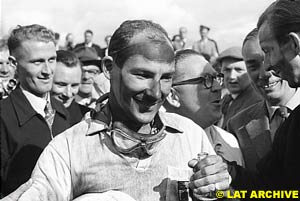 There were, he says, "literally hundreds" of girls and you can see why they adored him. Men love him, too. The photographer practically genuflects in his presence. Stirling won 16 Grands Prix, was the only Englishman to win the Mille Miglia and was twice voted driver of the year. Yet in 1962 he was forced to retire after a near-fatal crash at Goodwood left him unconscious for more than a week and partially paralysed for more than six months.
There were, he says, "literally hundreds" of girls and you can see why they adored him. Men love him, too. The photographer practically genuflects in his presence. Stirling won 16 Grands Prix, was the only Englishman to win the Mille Miglia and was twice voted driver of the year. Yet in 1962 he was forced to retire after a near-fatal crash at Goodwood left him unconscious for more than a week and partially paralysed for more than six months.
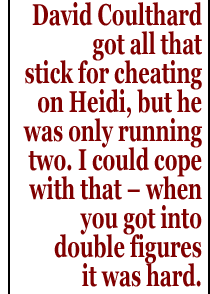 "Well, there's a lot of rubbish in racing," he chortles. "If you wave to people they start waving back and the organisers think, 'My God he's popular, we'll pay him more next year.' Then every car I have ever passed, I always say thank you, or shake a fist if the driver's done something bad. It's pretty off-putting for the other drivers. They think, 'Christ, how has he got the time to do all that?'"
"Well, there's a lot of rubbish in racing," he chortles. "If you wave to people they start waving back and the organisers think, 'My God he's popular, we'll pay him more next year.' Then every car I have ever passed, I always say thank you, or shake a fist if the driver's done something bad. It's pretty off-putting for the other drivers. They think, 'Christ, how has he got the time to do all that?'"
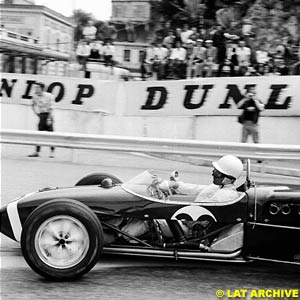 Ever pragmatic, Stirling was not happy with the first draft of his biography. "It was all about racing and I said to Robert Edwards, who wrote it, 'Look here, old boy, we've got to bring in the personal side.' The author felt that was an invasion of privacy and that it might upset my wife, but I said 'It's got to be warts and all.' What's the point of a biography if it's not? It's like not writing about the races that I lost."
Ever pragmatic, Stirling was not happy with the first draft of his biography. "It was all about racing and I said to Robert Edwards, who wrote it, 'Look here, old boy, we've got to bring in the personal side.' The author felt that was an invasion of privacy and that it might upset my wife, but I said 'It's got to be warts and all.' What's the point of a biography if it's not? It's like not writing about the races that I lost."
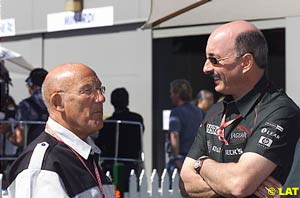 Third time round, Stirling hit the jackpot with Susie, the daughter of friends from Hong Kong, whom he first met when she was five. He had a fling with her elder sister, then fell in love with Susie when she came to work in London, as his secretary. They have been married for 21 years and have a son, Elliot, aged 20.
Third time round, Stirling hit the jackpot with Susie, the daughter of friends from Hong Kong, whom he first met when she was five. He had a fling with her elder sister, then fell in love with Susie when she came to work in London, as his secretary. They have been married for 21 years and have a son, Elliot, aged 20.
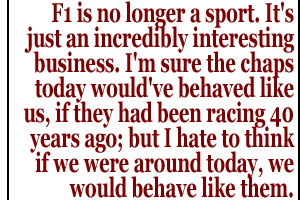 Relations with son Elliot, who lives in the basement, are a little more strained. "I'm not jealous of my son, but I'm jealous of the time that his mother has with him. It's a bloody bore sometimes, two men in the same house going for the same girl." Elliot is a trainee chef. "At last he's found something he wants to do with his life, but it took him a long time. I was quite different. I knew from 17 exactly what I wanted to do. The way he dresses is appalling. You know, there's not a lot of style around these days."
Relations with son Elliot, who lives in the basement, are a little more strained. "I'm not jealous of my son, but I'm jealous of the time that his mother has with him. It's a bloody bore sometimes, two men in the same house going for the same girl." Elliot is a trainee chef. "At last he's found something he wants to do with his life, but it took him a long time. I was quite different. I knew from 17 exactly what I wanted to do. The way he dresses is appalling. You know, there's not a lot of style around these days."
This article is republished by consent and is provided under the Atlas F1 terms and conditions.
|
Volume 7, Issue 33
Atlas F1 Special
Interview with Stirling Moss
Formula One Hundred: The Denouement
Motorvation III
Hungarian GP Preview
The Hungarian GP Preview
Technical Preview: Hungary
Focus: Hill in Hungary
Columns
Elsewhere in Racing
The Heinz-Harald Frentzen Trivia Quiz
Bookworm Critique
The Weekly Grapevine
> Homepage |